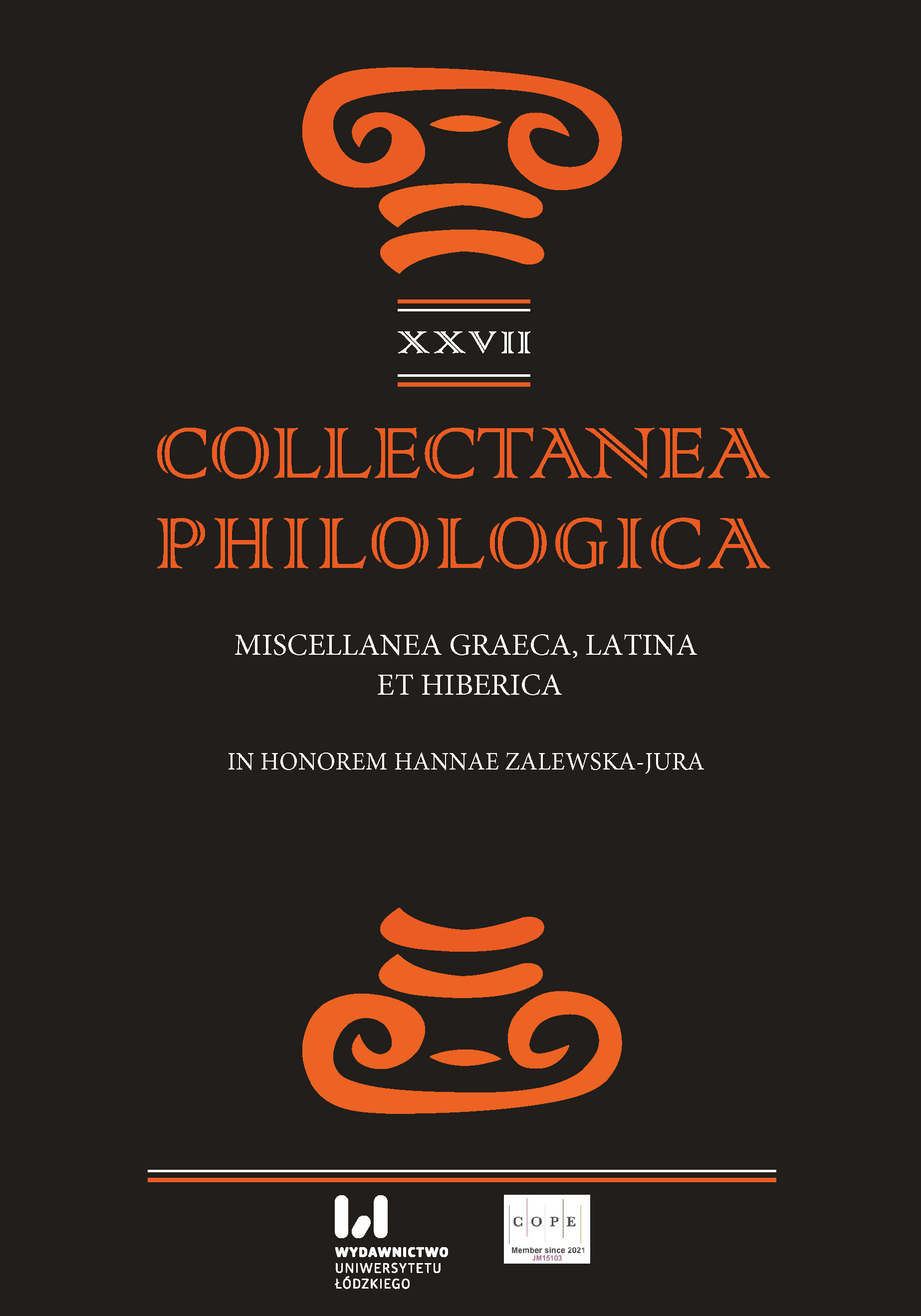Locuciones latinas y variación lingüística en el español del siglo XXI
DOI:
https://doi.org/10.18778/1733-0319.27.24Słowa kluczowe:
łacina, język hiszpański, wyrażenia idiomatyczne, lingwistyka korpusowa, zmienność językowaAbstrakt
The objective of this article is to analyze the effect of linguistic variation in Latin idioms in Spanish, invariable lexical units, from a normative point of view. To do this, first of all, we define and distinguish Latin idioms within Latinisms in the Spanish language. Afterwards, we present its typology and main structures, according to Sánchez Martínez (1993). Later we discuss the normative treatment of Latin phrases by RAE, not exempt from some contradictions and changes in criteria over time. In the analytical part, we synthesize the meaning and normative use of 32 widely used Latin idioms. Finally, based on the linguistic corpus CORPES XXI, we carry out a quantitative analysis of the linguistic variants of the selected Latin idioms, with an example of each variant.
Bibliografia
Barea Torres, C. (2019). Verba quoque manent: Análisis referencial de expresiones latinas mediante corpus lingüísticos. Thamyris 10. 265-292. https://doi.org/10.24310/thamyristhrdcc.v10i16525
Google Scholar
DOI: https://doi.org/10.24310/thamyristhrdcc.v10i16525
Bustos Tovar, J. J. de (1974). Contribución al estudio del cultismo léxico medieval (1140-1252). Boletín de la Real Academia Española. Anejo XXVIII. Madrid.
Google Scholar
Clavería Nadal, G. (1991). El latinismo en español. Barcelona: Departament de Filología Espanyola – Universitat Autònoma de Barcelona.
Google Scholar
FundéuRAE. (04/02/2011a). a priori y a posteriori, en cursiva. https://www.fundeu.es/recomendacion/a-posteriori/ (30.12.2023).
Google Scholar
FundéuRAE. (04/02/2011b). alter ego, sin acento y en cursiva. https://www.fundeu.es/recomendacion/alter-ego/ (30.12.2023).
Google Scholar
FundéuRAE. (04/02/2011c). corpore insepulto, no de corpore insepulto ni corpore in sepulto. https://www.fundeu.es/recomendacion/corpore-insepulto/ (30.12.2023).
Google Scholar
FundéuRAE. (04/02/2011d). ex cathedra y ex cátedra, ambas formas son válidas. https://www.fundeu.es/recomendacion/ex-catedraex-cathedra/ (30.12.2023).
Google Scholar
FundéuRAE. (04/02/2011e). ipso facto, no de ipso facto. https://www.fundeu.es/recomendacion/ipso-facto/ (30.12.2023).
Google Scholar
FundéuRAE. (04/02/2011f). mutatis mutandis, no mutatis mutanda. https://www.fundeu.es/recomendacion/mutatis-mutandis/ (30.12.2023).
Google Scholar
FundéuRAE. (04/02/2011g). stricto sensu, no strictu sensu ni stricto senso. https://www.fundeu.es/recomendacion/stricto-sensu/ (30.12.2023).
Google Scholar
FundéuRAE. (24/05/2011). ex aequo y no exaequo ni ex-aequo. https://www.fundeu.es/recomendacion/ex-aequo-y-no-exaequo-ni-ex-aequo-606/ (30.12.2023).
Google Scholar
FundéuRAE. (29/03/2013). locuciones latinas, errores frecuentes. https://www.fundeu.es/recomendacion/locuciones-latinas-latinismos-errores-frecuentes-621/ (30.12.2023).
Google Scholar
FundéuRAE. (21/05/2013). statu quo, no status quo. https://www.fundeu.es/recomendacion/statu-quo-no-status-quo/ (30.12.2023).
Google Scholar
FundéuRAE. (08/07/2013). la alma mater, no el alma mater. https://www.fundeu.es/recomendacion/la-alma-mater-no-el-alma-mater-1563/ (30.12.2023).
Google Scholar
FundéuRAE. (08/10/2013). post mortem, separado, sin tilde y en cursiva. https://www.fundeu.es/recomendacion/post-mortem-separado-sin-tilde-y-en-cursiva/ (30.12.2023).
Google Scholar
FundéuRAE. (29/03/2016). modus operandi, no modus operandis. https://www.fundeu.es/recomendacion/modus-operandi-invariable-en-plural/ (30.12.2023).
Google Scholar
FundéuRAE. (14/06/2017). per se, y no per sé, persé o perse. https://www.fundeu.es/recomendacion/per-se-perse-per-se/ (30.12.2023).
Google Scholar
FundéuRAE. (23/08/2018). per saltum, en cursiva y sin acento gráfico. https://www.fundeu.es/recomendacion/per-saltum-cursiva-tilde-acento/ (06.01.2024).
Google Scholar
FundéuRAE. (21/08/2020). habeas corpus, en cursiva y sin tilde. https://www.fundeu.es/recomendacion/habeas-corpus-en-cursiva-y-sin-tilde/ (30.12.2023).
Google Scholar
FundéuRAE. (10/12/2021). grosso modo, no a grosso modo. https://www.fundeu.es/recomendacion/grosso-modo/ (30.12.2023).
Google Scholar
DOI: https://doi.org/10.53971/2718.658x.v12.n19.33815
FundéuRAE. (07/04/2023). urbi et orbi y no urbi et orbe. https://www.fundeu.es/recomendacion/urbi-et-orbi/ (30.12.2023).
Google Scholar
FundéuRAE. (29/09/2023). persona non grata, uso adecuado. https://www.fundeu.es/recomendacion/non-grato-es-una-expresion-incorrecta-952/ (30.12.2023).
Google Scholar
Lázaro Carreter, F. (1962). Diccionario de términos filológicos. Madrid: Gredos.
Google Scholar
RAE, Real Academia Española. (2021). Estatutos y reglamento de la Real Academia Española. Madrid. https://www.rae.es/sites/default/files/2021-02/Estatutos%20y%20reglamento_2014_19_2_2021.pdf (08.01.2024).
Google Scholar
RAE, Real Academia Española. (2023). Banco de datos (CORPES XXI). Corpus del Español del Siglo XXI (CORPES). http://www.rae.es (28.11.2023).
Google Scholar
RAE, Real Academia Española (2023). Diccionario de la lengua española (DLE). 23.ª ed., [versión 23.7 en línea] https://dle.rae.es/ (28.11.2023).
Google Scholar
RAE, Real Academia Española. (2023). Diccionario panhispánico del español jurídico (DPEJ). https://dpej.rae.es/ (06.01.2023).
Google Scholar
RAE, Real Academia Española; Asociación de Academias de la Lengua Española. (2010). Ortografía de la lengua española (ORAE). Madrid: Espasa Libros.
Google Scholar
Rubio Heras, L. (2002). Latinismos, ¿mito o realidad?. Res Diachronicae 1. 324-329.
Google Scholar
Sánchez Doncel, G. (1997). Diccionario de latinismos y frases latinas. Madrid: Noesis Editorial.
Google Scholar
Sánchez Martínez, C. (1993). Aproximación a los latinismos léxicos, locuciones y frases hechas latinas. Myrtia 8. 131-155.
Google Scholar
Sánchez Vidal, Ó. (2013). El empleo de las nuevas normas ortográficas sobre los latinismos y locuciones latinas en la prensa española. Thamyris 4. 33-45.
Google Scholar
Opublikowane
Wersje
- 2024-10-30 - (2)
- 2024-10-30 - (1)
Jak cytować
Numer
Dział
Licencja

Utwór dostępny jest na licencji Creative Commons Uznanie autorstwa – Użycie niekomercyjne – Bez utworów zależnych 4.0 Międzynarodowe.












